Star Trek is, generally speaking, hopeful. “Of Gods and Angles” plays at hopeful, but is kind of the opposite.
A Starfleet ship ferries representatives from two warring factions when suddenly things go sideways. It’s a Star Trek tale as old as time. Tellarites and Andorians. Selay and Anticans. There are so many diplomatic missions on the Enterprise-D that there’s even a joke about how the ship is only so big so it can hold diplomats in the episode “Remember Me”.
“Of Gods and Angles” plays on this trope in a very common way — at first. The brief is this: there’s a race of photonic cubes and a race of photonic spheres on the Cerritos that hate each other for absolutely not reason. They both suck. They nearly cause everyone’s death. And then they get over it through a foisted-upon-them compromise.
But there’s something different about this episode. And it’s not just the extra transparent metaphor where the cubes are blue and the spheres are, basically red. But before we get to that:
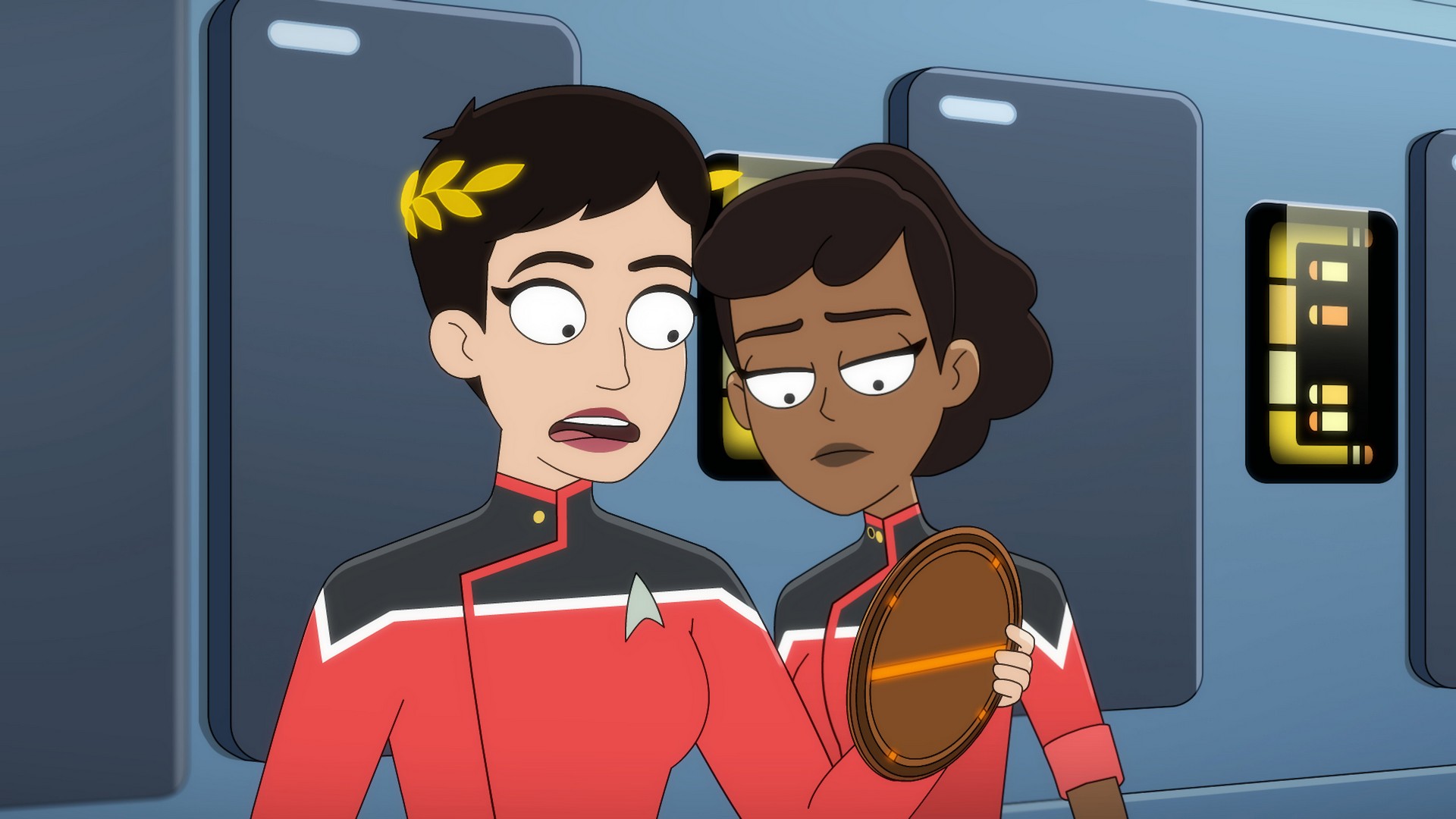
To Boldly Recap “Of Gods and Angles”
So. Spheres. Cubes. They hate each other. And at the center of it all is a missing persons case that threatens to cause a war. And the motley pair who investigate are Mariner and… Olly? That’s right! A new character—and this one’s a demigod!
Olly constantly takes risky shortcuts, ignores orders, and creates chaos. Freeman intends to drum her out of Starfleet. Naturally Mariner thinks she and Olly should be besties. So they team up to find a missing cube who just so happens to be the head cube’s offspring.
Immediately things go sideways as is the formula. The cube’s quarters are a wreck. There’s stuff missing. Foul play is suspected. Olly finds anti-cube propaganda in a sphere’s locker. There’s an interrogation that causes even more fighting between the spheres and cubes. It turns out the head sphere’s kid is also missing.
Mariner gets Olly to use her lightning powers (she’s Zeus’s granddaughter) to fix things. This yields war instead. Thankfully Olly uses her engineering skills to stop the war just in time for the reveal that the missing sphere and cube are a sexy item. And they have a kid! Which… ends the war? Alright?
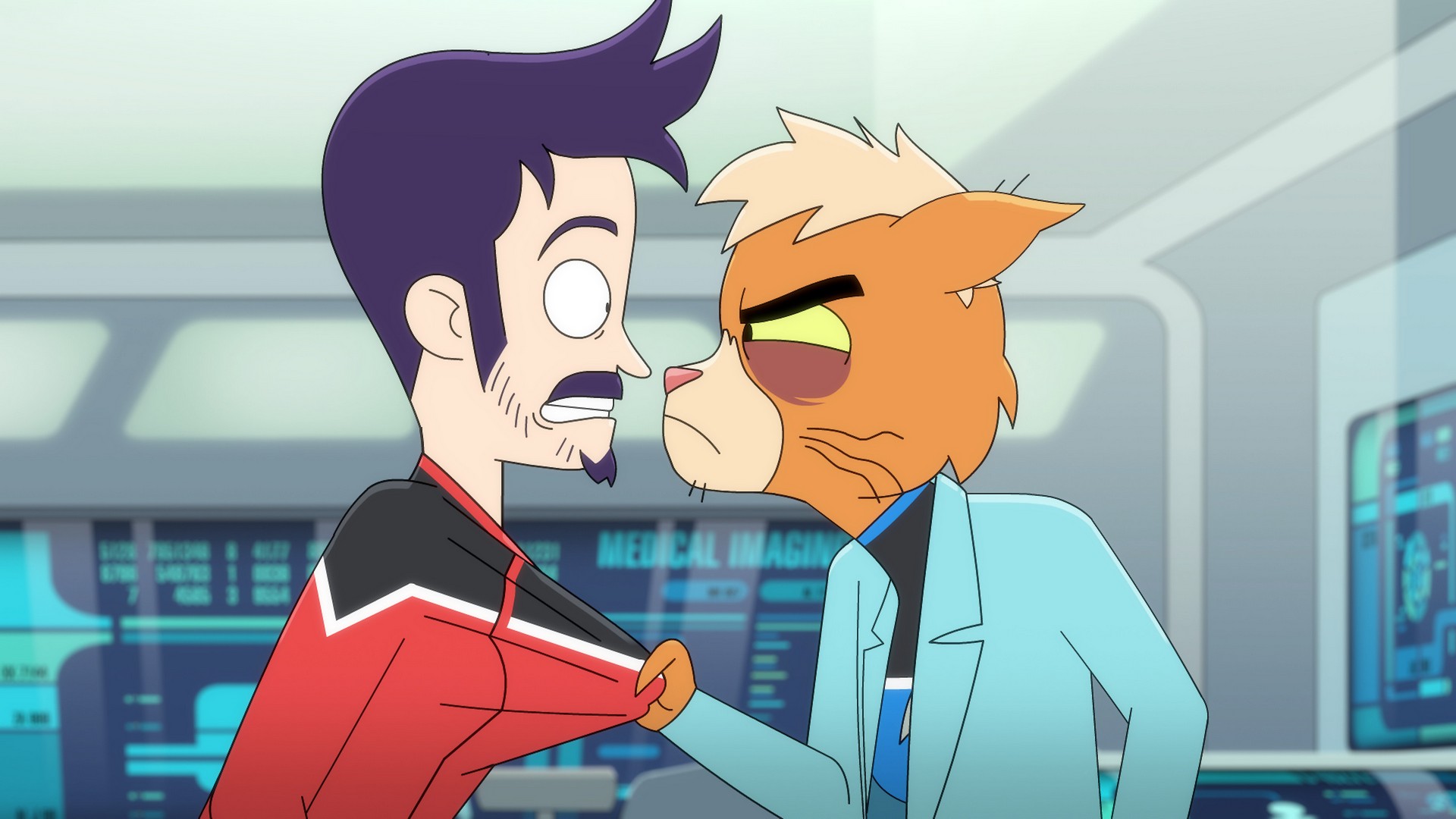
The B Plot
While all the cubey spherey nonsense is going on, Boimler is checking out his alt. universe self’s PAD again. Why is that Boimler so successful beyond the bangin’ beard? Boimler’s theory is it’s because alt. Boimler is besties with Dr. T’Ana. So his plan is to join her book club. Rutherford and Tendi think this is a bad idea. Just be yourself, man!
Boimler does not listen. The results include: accidental hypospray inhalation, a violent attack by T’Ana, and Boimler getting a lightning bolt in the ass! But also, the resulting operation to save Boimler’s posterior does result in T’Ana liking him—and inviting Boimler to join her book club!
Rutherford concludes that Boimler is right! They should be more like people they aren’t! Tendi hates this result, likely in part because alt. universe Rutherford is an emotionless robot. And Tendi? You are not alone.
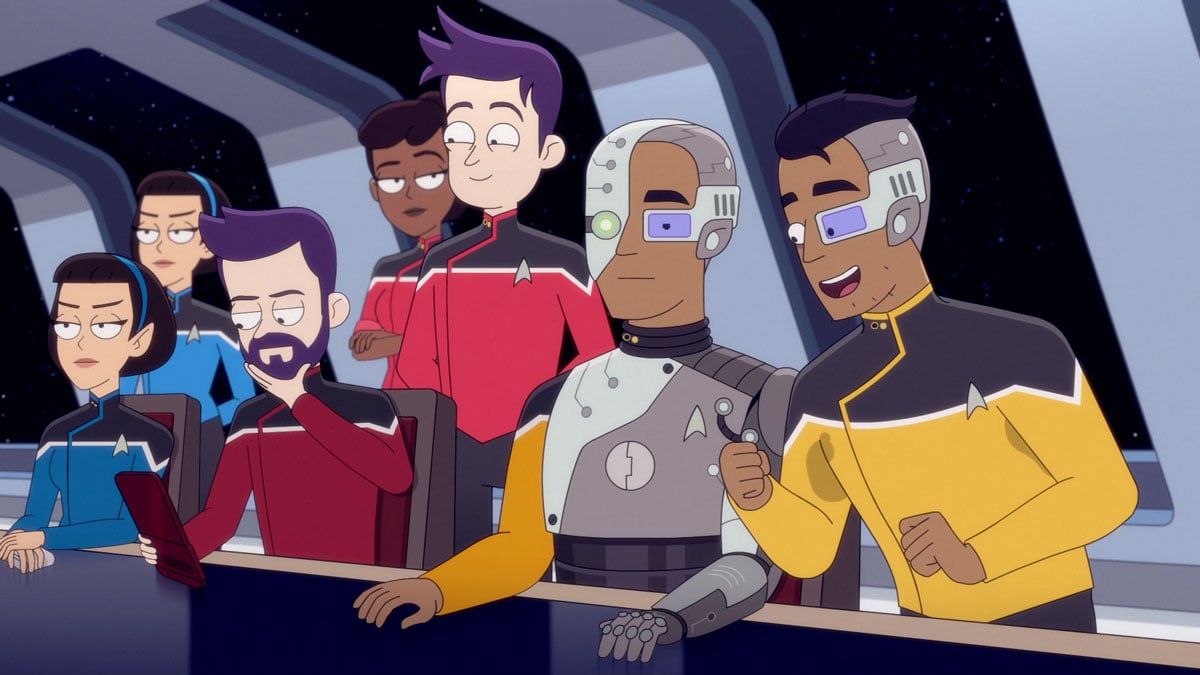
“Of Gods and Angles” and Feeling Bad
On first viewing, I confess: I hated “Of Gods and Angles”. It just makes me feels so bad. But then I thought: is that the point? Is “Of Gods and Angles” an intentional bummer hiding among the trappings of the usual goofy Lower Decks shtick?
All the silly stuff is present. References to classic episodes like “Who Mourns For Adonis”. Boimler gets something in his ass. A glib joke about how the super powerful cubes and spheres have zero creativity? It’s all there. The ending even features Mariner asking Olly goofy questions while they share time in the brig. Classic Lower Decks.
And yet amid the trappings is something deeply nihilistic.
There’s the bickering blue and red political parties who make everyone’s life hell for no reason. There’s two nepo babies tasked with cleaning the mess who nearly getting everyone killed in the process. The Nepo babies still get rewarded. And the conflict only ends because of a third party option. Which, now that I say it, is less nihilistic and more unrealistic. But still a a bummer!
And then there’s Boimler and Rutherford who are just regular guys. Their lesson is: be someone else. Be the version of you that fits this paradigm. I can’t tell if this is played for a joke or if this is where the rest of the season goes, but I have misgivings about both options.
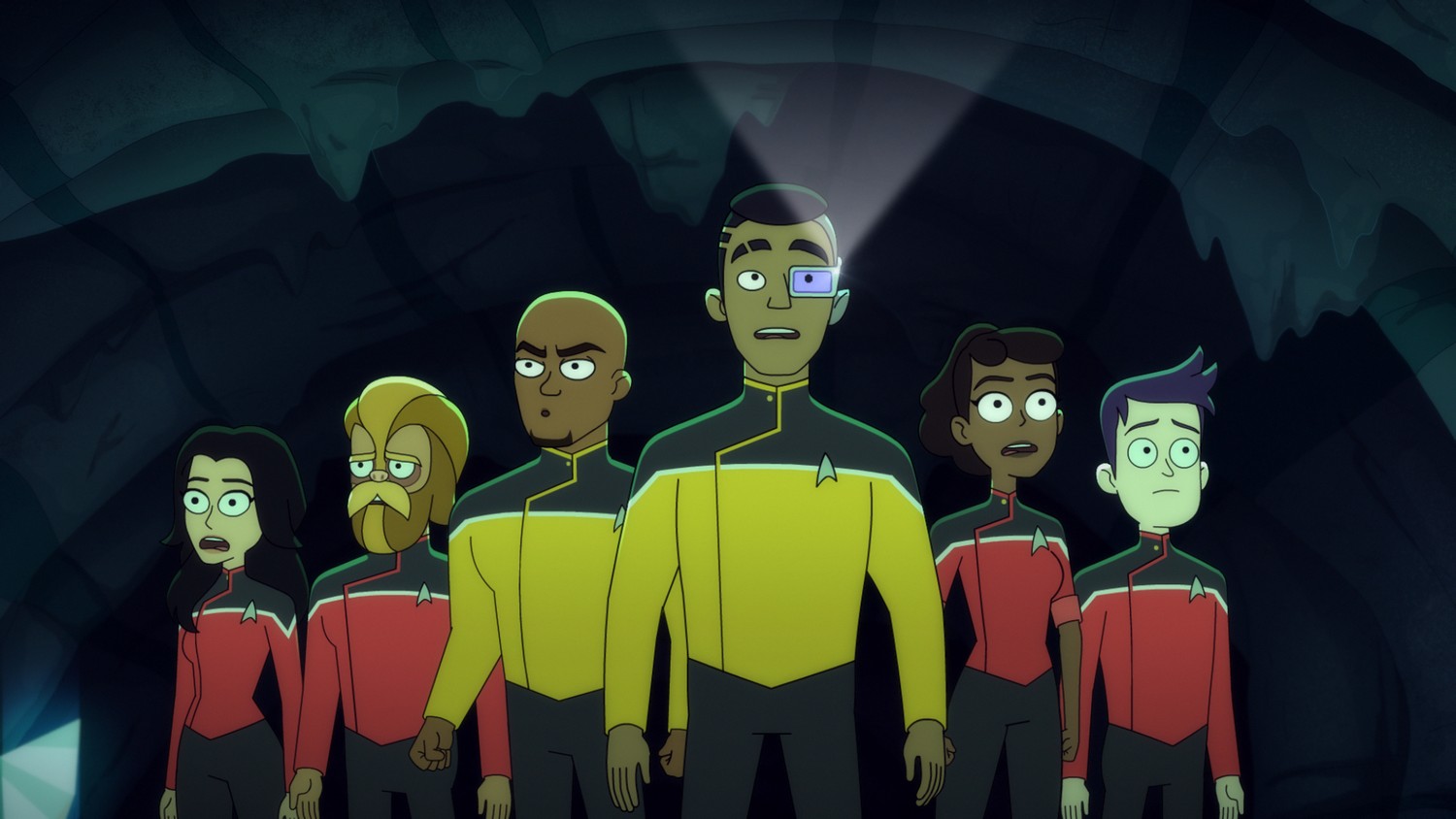
Oh, Star Trek Optimism, Where Art Thou?
Most of us watch Star Trek because it provides a glimmer of hope even in the darkest times. Star Trek is sci-fi optimism as a rule. It suggests that, someday, we may have a post scarcity society where diseases are curable, bigotry is minimized, and we get to go to space!
Intentionally or not “Of Angles and Gods” suggests a much darker side to that. It is an episode of Lower Decks where, despite post scarcity and seemingly infinite opportunity, things are kind of bad! And that, upon reflection, is this season’s theme.
Ma’ah may be a captain again, but the Klingon Empire is corrupt to the point that he wants nothing to do with it. Starfleet leaves Starbase 80 to fend for itself proving infrastructure in the Federation is busted. And Boimler’s growingly popular theory is basically that the alt. universe where Mariner is an abusive tyrant is the better option.
Subscribe to our newsletter!
Get Tabletop, RPG & Pop Culture news delivered directly to your inbox.
My question is: how does LD resolve this with only four episodes without either staying negative or winding up with a resolution which feels unearned?
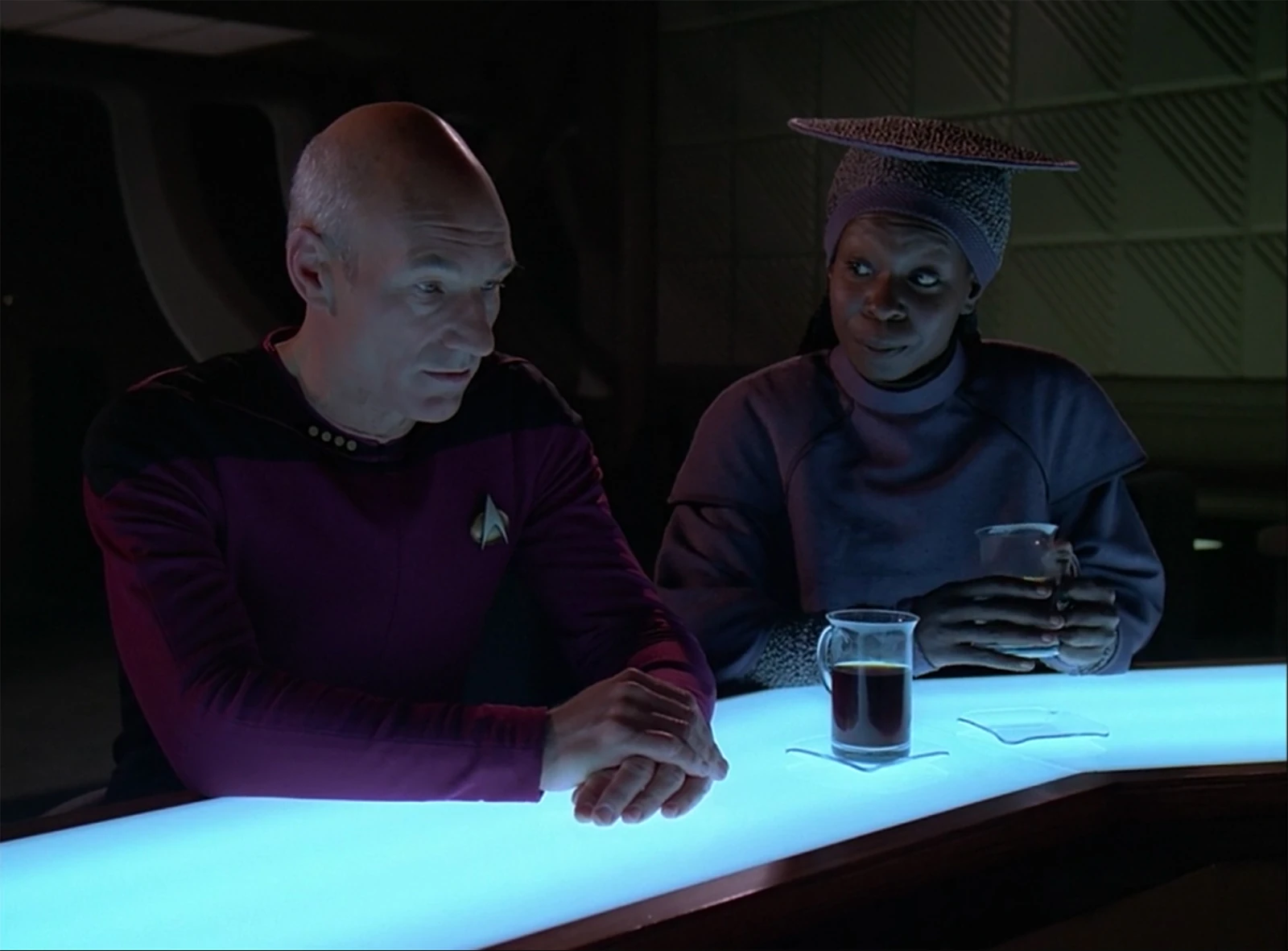
“Of Gods And Angles” and the Star Trek Formula
Star Trek, the version I grew up with, consists largely of morality plays. A problem arises, it raises philosophical questions, our crew works the problem, and discover in themselves the ability to see beyond the moment so they can make the best choice in that moment.
Even the darker side of Star Trek is like this. When Picard tours the Enterprise the night before the Borg battle, he believes this is the end of his civilization. But Guinan, whose people were almost entirely wiped out by the Borg, tells him “this is not the end”.
Guinan doesn’t offer hope in the moment. She knows people will die, but she sees beyond that. “As long as there’s a handful of you to keep the spirit alive, you will prevail—even if it takes a millennium.” The hope Guinan offers is the kind you have to believe in because it’s hope for a future and a people you will never see.
The thing is: we need that version of Star Trek right now so badly. A lot of us won’t survive this moment and we need Star Trek to remind us that our hope is for the future, for the people we’ll never meet.
And while I applaud the team’s willingness to take risks with the Trek formula, I worry that “Of Gods and Angles” suggests an ending for LD that comes up short of that needed dose of Star Trek optimism.
Stay strong, Cerritos! We need you now more than ever.
Don’t Miss:
Lina is a 10+ year entertainment journalist veteran whose bylines include SYFY Wire, Looper, and Screen Fanatic. She has written comic scripts for IDW Comics and Zenescope Enetertainment and has written Doctor Who shorts for BBC Worldwide. She is a long-time podcast host and producer who has worked on Who Won the Week, SYFY’s Every Day series, and the Amazon podcast Untold Story. She currently co-hosts the New York Times recommended podcast Song vs Song.
Read more at this site
